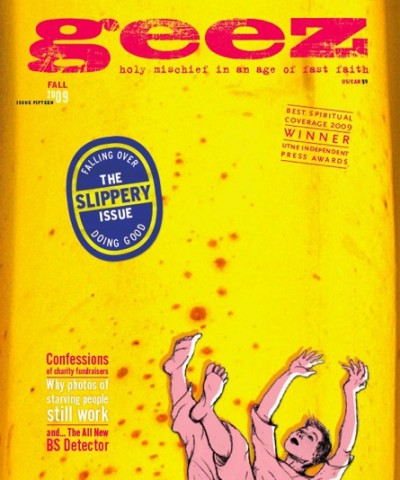The ‘war on cancer’
Cancer fundraising efforts used to portray people with the disease as “victims” or “sufferers.” Now they are “survivors,” whose stories are highly profitable commodities in a marketing campaign shaped by the ever-expanding collaboration between corporations and powerful non-governmental organizations.
Reflections of a conscientious objector
Illness is the night-side of life, a more onerous citizenship. Everyone who is born holds dual citizenship, in the kingdom of the well and in the kingdom of the sick. Although we all prefer to use only the good passport, sooner or later each of us is obliged, at least for a spell, to identify ourselves as citizens of that other place.
When I first read these opening words in Illness as Metaphor by Susan Sontag, I thought them interesting, but not personally relevant. Now, over 30 years later, having been diagnosed with and treated for breast cancer, I read them as one whose passport is stamped as a reluctant traveler into “the kingdom of the sick.”
Sontag’s seminal work sheds light on the influence of metaphor in shaping the ways we think about, experience and respond to illness. Of particular interest to her is the use of war metaphor in framing messages about breast cancer.
The only way we in the West seem capable of coping with things we fear, whether cancer, drugs or terror, is to declare war on them. Making war still seems to be the way we choose to muster, or manipulate, large numbers of people in a common cause. So in 1971, President Nixon declared the “War on Cancer.”
This war became what epidemiologist Devra Davis calls a “D-Day-style offensive, an all-out invasion against the enemy.” The tactics and weapons employed were created, to a considerable extent, by the post-WWII military-industrial complex; for example, mustard gas was a precursor to chemotherapy.
The war metaphor has served the cancer industry at the expense of prevention.
In her book, The Secret History of the War on Cancer, Davis says the “proof that how and where we live and work affects the chances we may get cancer was basically ignored.” She says cancer research is controlled by members of “astonishing alliances between naïve or far too clever academics and folks with major economic interests in selling potentially cancerous materials.” Such research has all too often morphed into “the science of doubt promotion” – the well-funded notion that we can’t say we know anything (about causes of cancer) until we can say we know everything.
Certain pharmaceutical corporations have profitable feedback loops in which one division makes chemicals that are carcinogenic and another makes products that treat cancer. In Women’s Health in Canada, Hankivsky et al cite the chemical conglomerate AstraZeneca as an example. AstraZeneca produces tamoxifen, the biggest selling breast cancer drug, as well as the carcinogenic herbicide acetochlor. It is also the primary sponsor of National Breast Cancer Awareness Month, a campaign that rarely mentions prevention at all.
Cancer fundraising efforts used to portray people with the disease as “victims” or “sufferers.” Now they are “survivors,” whose stories are highly profitable commodities in a marketing campaign shaped by the ever-expanding collaboration between corporations and powerful non-governmental organizations.
In Pink Ribbons, Inc. – Breast Cancer and the Politics of Philanthropy, Samantha King explores the ways in which the commodification of breast cancer co-opts compassion in the interests of the multi-billion dollar cancer industry. She offers the Susan G. Komen Breast Cancer Foundation as an example. The foundation proclaims it is “the largest source of nonprofit funds dedicated to the fight against breast cancer in the world” and King credits its founder, Nancy Brinker, with “turning the disease into a marketable product with which consumers, corporations and politicians are eager to associate.” Their list of sponsors is a who’s who of the cancer treatment industry. Through activities such as the “Race for the Cure” they raise billions of dollars. Not surprisingly these events are de-politicized. Attempts to highlight uncomfortable associations are effectively squelched or viewed as spoiling the hopefulness of the day.
As poster children in this marketing campaign, those of us who have had cancer are touted as plucky, wise and smiling survivors, never as indignant critics of the cancer industry. Like converts at a tent-revival altar call we are asked to give our tearful though ultimately cheery testimonies. This is the message that sells and motivates millions of people to run, walk, swim, paddle and, most of all, buy. Thus one can feel good about buying a range of pink products – everything from pink toasters to “Pink Ribbon Barbie.”
I neither pass judgment on the way in which anyone travels his or her cancer journey nor minimize the solidarity found in paddling a fundraising dragon boat. I also accept all things pink given by people doing their best to be supportive. Yet, I strongly challenge citizens of both the kingdom of the well and that of the sick to examine the interests of those who ask for our money, our compassion and our complicity in the wholesale refusal to adequately explore the environmental, social and economic origins of cancer (and the disparity of access to treatment).
We need fewer proponents of what Samantha King calls the “tyranny of cheerfulness” and more of what the late poet Audre Lorde envisioned – the corridors of power reverberating with the demands of thousands of one-breasted women and those who love them demanding that cancer-causing chemicals be outlawed. After all, I can only be healthy if I live in a community in which the air, water and food is free of poison for everyone.
Sandra Malasky has a Master of Public Health degree from the University of North Carolina and a theology degree from Duke University. She has worked as a health policy analyst, women’s health advocate and hospice chaplain.



Sorry, comments are closed.